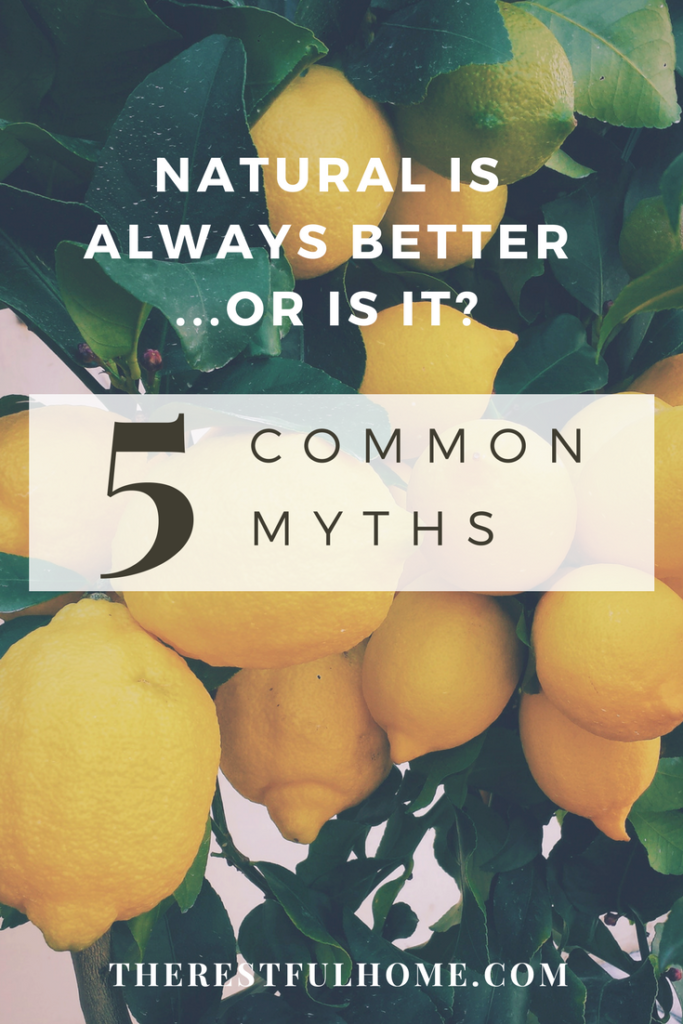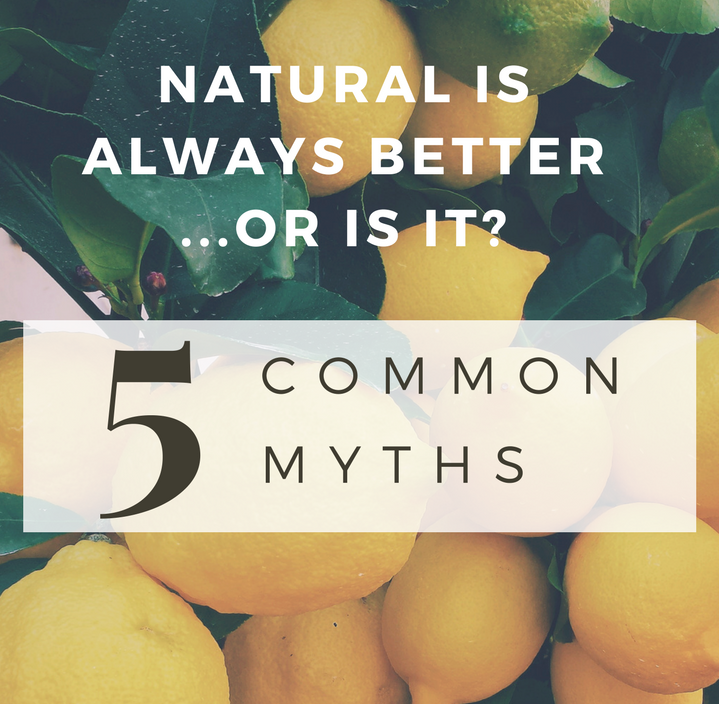
Did you know that there are 1000 unpronounceable chemicals in your baby’s lotion?
Have you thought about what medicines do to your gut? Look into essential oils!
Why are you using that shampoo? Your hair might look great, but you’re going to get cancer!
The current craze for all-natural-everything has made the essential oil business boom. Most of us, even those who don’t make everything “the natural way,” have bought into the idea that natural is always better. But is it really? Who defines natural? Let’s look at five common misconceptions:
Myth 1: Natural is Always Better for Your Baby’s Skin/Hair Products
Yes, some of the chemicals in cheap baby shampoos could cause problems, especially if your baby has sensitive skin. I personally make my own natural baby shampoo and love it, but there are some caveats:
- The soap isn’t tear-free. I have to rinse Baby J’s face very quickly if any of his shampoo gets into his eyes, or he will spend the rest of bathtime crying. If your baby constantly grabs her hair and wipes down, or if she has very sensitive eyes, I would recommend buying a tear-free shampoo. (Yes, a shorter list of ingredients still looks better to most of our natural-loving eyes–but that is possible! Check out this natural-ingredient-filled, tear-free option from Puracy.)
- Natural baby shampoos often contain essential oils for fragrance (mine does). But you can’t just use any essential oil. Some essential oils are so dangerous for your children that Poison Control actually recommends you throw out essential oils if you have a baby at home. Be careful!
Myth 2: Natural is Always Better for Your Cleaning Supplies
I’ve tried to switch many of our cleaning supplies to natural solutions that are friendlier to the environment. I’m 100% in favor of ditching all the poisons we regularly use and replacing them with vinegar. Vinegar rocks! And its odor dissipates, much to my husband’s relief! But sometimes, you need the strong stuff.
- Bleach still wins when you have mildew. Mold and mildew can cause so many health problems that you don’t want to play around with them–go after them with a vengeance! To keep bleach fumes from burning your brain cells, use a respirator with organic vapor cartridges.
Myth 3: Natural is Always Better for Treating Pregnancy Symptoms
While most healthy pregnancies would benefit from a clean-eating, low-medicine regimen, not all pregnancies are healthy. If you have a high-risk pregnancy or can’t stop vomiting, you may be putting your baby at risk by refusing medicine. I have to admit that I did this during my pregnancy with hyperemesis gravidarum. No medicine for me for weeks at a time, as I vomited everything I ate or drank. Although I eventually had to regularly pop a pill during the second trimester in order to stop losing weight and protect the baby, I fought against it for as long as I could. Now, I realize that my stubbornness, while intended to protect my baby, could have actually hurt him if I had stayed dangerously dehydrated.
A scary quote I wish I’d read during my stubborn first trimester:
Dehydration during pregnancy can lead to serious pregnancy complications, including neural tube defects, low amniotic fluid, inadequate breast milk production, and even premature labor. These risks, in turn, can lead to birth defects due to lack of water and nutritional support for your baby. (Read the rest here.)
Ultimately, while natural is preferred, not everyone can or should take that route.
Myth 4: Natural is Always Better for Treating Illnesses
While many common colds or other easily-treated illnesses can be fixed with timeworn remedies (eat garlic and honey, sleep for ten days, and you’re all better), natural doesn’t always work the magic we hope it will. And avoiding the doctor’s dangerous medicines can be dangerous. Strep throat, for example, left untreated by antibiotics can lead to rheumatic fever, which can lead to heart damage. (I’m preaching to myself here, since I absolutely hate going to the doctor and avoid it at all costs.)
Another thing to point out here is that the common practice now of diffusing essential oils (or rubbing them on your feet, etc.) when you’re sick could cause a whole new layer of problems if you or your family members have allergies. (Read more about that HERE.)
Myth 5: Natural is Always Better for Everything
Yes, advertisers are now stamping “natural” on all their products that have the most remote claim to plant ingredients. They know that we like the word “natural,” and so they are using it whenever possible. “Natural,” “green,” “contains essential oils,” “scented with natural plants.” I love seeing those words, and I’m more likely to drop items using that kind of branding in my cart than ones missing the green stamp of environmental correctness. But what does that really mean? Turn the bottle over, and you’ll notice its ingredient list isn’t much different from that of the bottle next door. They’ve just cleverly pulled that little bit of aloe vera into “natural” branding magic. Be careful what you believe. Natural isn’t always better. And sometimes it isn’t even “natural.”
Whatever that means.
To Sum It Up
Natural is always better. We’ve agreed to that–but maybe we’ve been premature. While going green in every area of your life will help the environment and your health in most cases, sometimes you have to take advantage of modern inventions. Bleach, antibiotics, and that stylist shampoo are not the enemy. Let’s go plant-based and natural where we can, but let’s not make Natural our lord and master.

